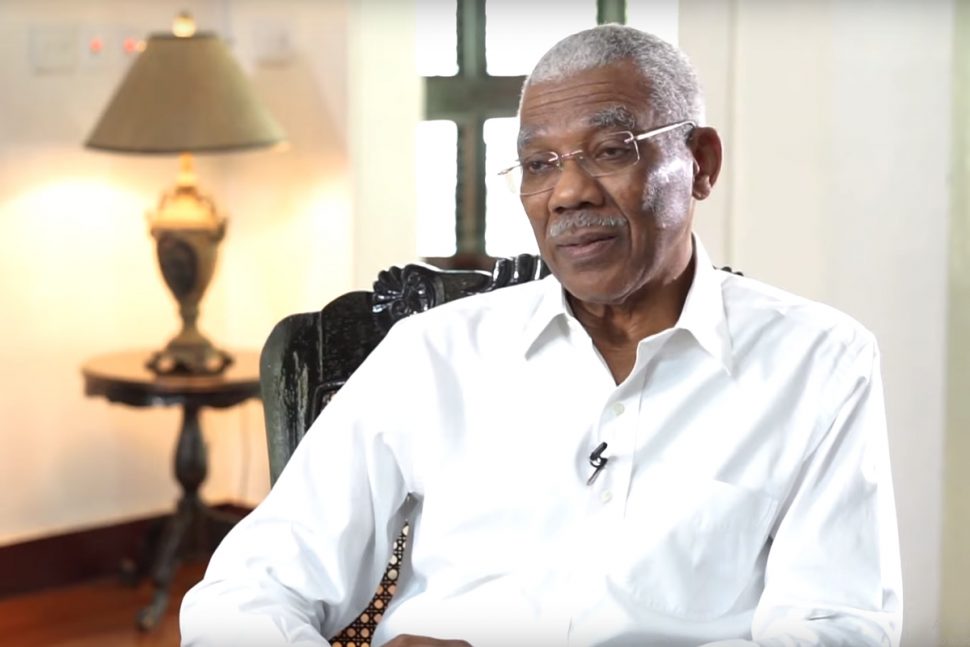Restating that his government has accepted its “interim” status, President David Granger says that the APNU+AFC administration will not pass a budget and will conform to the “half a dozen” international conventions which govern such a period.
Notwithstanding, the government will continue to perform its routine functions, the President told the Ministry of the Presidency’s Deputy Director of Press and Publicity Ariana Gordon during a special edition of The Public Interest programme, which was released on Friday evening.
Concerns about the exercise of power by the government have been raised after the Ministry of Finance issued a circular advising the various ministries and agencies to begin preparing the 2020 budget. The budget is usually presented in the National Assembly on the last Monday in November.
“There is nothing in the Constitution which defines interim status but in the jurisdictions which adhere to the Westminster system such as Canada, Australia and other countries, we have consulted with the laws and interim government means that we do not, for example, pass a budget,” Granger said on the programme.
The president explained that there are about half a dozen conventions with which they have to comply to ensure that government restrains expenditure and restrains its actions but he emphasised that it doesn’t mean government is out of office or ceases to function.
“There cannot be a void. We cannot have a country that is ungoverned,” he said, while adding that in adhering to these conventions, he “cannot undertake State visits, sign agreements with Foreign Countries; [has] to limit our expenditure [and has] to ensure that we don’t embark on any controversial projects.”
He referenced the text, Constitutional Law of Canada, by Professor Peter Hogg, as cited by the Chancellor of the Judiciary and the Caribbean Court of Justice (CCJ), as a guide to his government’s behaviour.
Hogg, in his text, wrote that in matters of policy, expenditure and appointments, the government should restrict itself to “activity that is: (a) routine, or (b) non-controversial, or (c) urgent and in the public interest, or (d) reversible by a new government without undue cost or disruption, or (e) agreed upon by the Opposition (in those cases where consultation is appropriate).”
Another guide, prepared by the Australian Government, is more specific in its conventions.
That text, Guidance on Caretaker Conventions, provides that government will cease taking major policy decisions except on urgent matters and then only after formal consultation with the opposition. The conventions, it is specified, apply to the making of decisions, not to their announcement.
Additionally, government will cease making major appointments of public officials but may make acting or short-term appointments; the Public Service adopts a neutral stance while continuing to advise the government ,and government will avoid entering major contracts or undertakings during the caretaker period.
“If it is not possible to defer the commitment until after the caretaker period for legal, commercial or other reasons, a minister could consult the Opposition, or agencies could deal with the contractor and ensure that contracts include clauses providing for termination in the event of an incoming government not wishing to proceed. Similar provisions cover tendering,” it explains, while adding that government ordinarily seeks to defer such major international negotiations, or adopts observer status until the end of the caretaker period.
There have been several differing opinions on the scope of the authority retained by government following the passage of the December 21 no-confidence motion which toppled the coalition government.
Political scientist David Hinds, a member of the Working People’s Alliance, told Sunday Stabroek recently that the only major difference between a “caretaker” and a normally functioning government is that at the top of the agenda of the former must be the holding of elections.
“It is [a] temporary government whose life in office is determined by the prescribed constitutional timeline or a two-thirds vote of the National Assembly,” he said, while adding that its popular mandate ended with the CCJ ruling and “it now serves at the pleasure of the constitutional requirements or of the legislature.”
The CCJ recently ruled that a December 21, 2018 no-confidence motion against the APNU+AFC government was valid, which means early elections have to be held according to constitutional stipulations.









